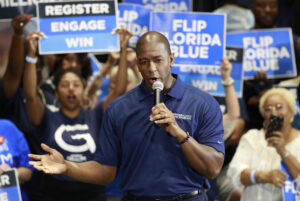A decision by the U.S. Supreme Court to strike down a New York gun law has raised questions about who will be able to carry firearms in public and where those guns can be carried in the state.
Here’s a Q and A about what will change, what will remain the same, and the issues that New York lawmakers will have to address as a result of the decision.
What did the Supreme Court rule?
The court looked at a New York law dating to 1913 that requires residents to obtain a concealed-carry license if they want to carry a handgun outside of the home.
Applicants had to prove they had a heightened need to carry a firearm in public for self-defense.
The Supreme Court’s conservative justices ruled in a 6-3 opinion that the requirement gives the state too much discretion to decide who should receive a license.
Who does the ruling affect?
Most New Yorkers who legally own a handgun have a restricted pistol license, meaning they can possess a firearm only in their home.
The ruling will make it easier for those license holders, and future applicants, to obtain an unrestricted license that allows them to carry in public.
A third category of pistol licenses allows people to carry and possess a handgun in public for their employment, such as a security guard of law enforcement officer. Those permit holders are not affected.
If I already have a restricted pistol/revolver permit, can I now carry in public?
No. You’ll still have to apply for the unrestricted permit, also called a concealed-carry permit, according to New York law enforcement officials.
What are some of the requirements for an unrestricted/restricted permit?
You have to be a New York resident, at least 21 years old, have no prior felony or serious convictions, and be of “good moral character.” The state requires you to submit the names of four people who can serve as references.
You’ll also have to submit a photo taken within the last 30 days, provide your fingerprints and have a legally recognized reason for wanting to possess or carry a firearm.
Are there still extra requirements for a permit to carry in public?
Yes. For an unrestricted permit to carry in public, you may be interviewed by a police officer or sheriff’s deputy, or be required to complete a training course at a shooting range. Those rules vary by county or local jurisdiction.
How will the court ruling change the permit application process?
For now, there’s no change. If you want to carry in public, applications must be submitted to your designated local licensing authority in the county where you live.
How long will it take to get a license to carry in public?
Before Thursday’s court ruling, the average processing time was six months, according to state officials. The cost and wait time varies by county.
Does the ruling change anything about long guns in New York?
No. The Supreme Court dealt specifically with the question of carrying handguns in public.
If I already have a license to carry in public, can I bring my handgun anywhere?
No. Those places that ban firearms from their property can continue to do so. You can’t bring a gun into most government buildings or schools. Private property owners, such as a movie theaters or shopping malls, can continue to ban all firearms.
Syracuse University and other private institutions can continue to ban guns from their property. In SU’s case, that includes the JMA Wireless Dome.
Did the Supreme Court say anything about where those with permits can’t carry guns?
Yes. The court said states can still restrict firearms from being carried in “sensitive places” such as schools or government buildings, where guns have long been banned. It will be up to states to define those places.
But the court warned against the idea of broader bans against firearms. The court said “there is no historical basis for New York to effectively declare the island of Manhattan a ‘sensitive place’ simply because it is crowded…”
What does this mean for other places where a lot of people gather?
That’s not clear. Justice Stephen Breyer noted in his dissent that the Supreme Court’s ruling leaves that question open.
“What about subways, nightclubs, movie theaters, and sports stadiums?” Breyer wrote. “The Court does not say.”
How long will it take to sort things out?
It could be months. The Supreme Court normally gives localities time to adjust to rulings that bring about major changes.
What happens next?
Gov. Kathy Hochul said she’ll call state lawmakers back to Albany on June 30 for a special session. She wants lawmakers to come up with new gun safety laws that conform with the Supreme Court’s decision.
How will state lawmakers respond?
State lawmakers are likely to focus on determining how and where to keep guns out of public places, according to Robert Spitzer, a SUNY Cortland professor who has authored five books on gun policy.
One possibility is to ban guns from all public places where a large number of people typically gather.
The state could also pass a broad ban on guns on private property, with exceptions only for individuals given permission to carry on a particular property.
Got a tip, comment or story idea? Contact Mark Weiner anytime by: Email | Twitter | Facebook | 571-970-3751

